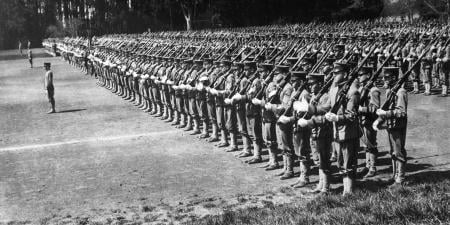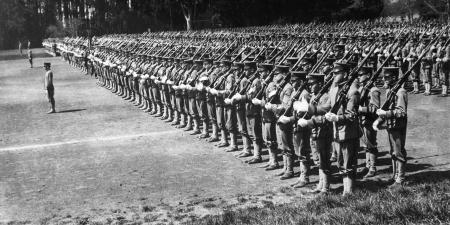Physicians have long been acknowledged, recognized, and sought after not only for their skills and knowledge as healers, but also for their contribution as involved citizens and advocates for social justice, order, and the public good. In many societies, physicians hold esteemed leadership roles and political offices. Examples from abroad include numerous physician leaders in Asia, Africa, and the Middle East, as well as the former Prime Minister of Norway, Dr. Gro Harlem Brundtland, who served in that capacity for over a decade and thereafter became the World Health Organization's director-general. In the United States, where one of the signatories to the Declaration of Independence was physician, soldier and statesman, Benjamin Rush, relatively few physicians are seen in the most prominent levels of government or political leadership today. Although there were 17 physicians in the 109th Congress, one can question their effectiveness, as most downplayed their medical backgrounds [1]. Two prominent exceptions are Howard Dean, MD, former governor of Vermont and current chairman of the Democratic National Committee, and William Frist, MD, the former Republican U.S. Senator from Tennessee.
While the history behind the apparent division of personal, professional, and public lives and their respective loyalties is beyond the scope of this paper, it is important to note that many physicians are conscientious citizens who function in broader circles than those of health care. Many have served in some governmental capacities -whether in the uniformed services (U.S. Public Health Service or military branches), the Indian Health Service, in appointed office, and, less often, in elected office. That physicians might find themselves advocating for a good greater than that of their individual patient's well-being should not come as a surprise, since they are educated and equipped to study diseases and other threats to public health. These same physicians, in academia, industry, and government have the collective wisdom to offer public policymakers and politicians solutions aimed at disease prevention and control and disaster relief. Many real world experiences that have contributed to the advance of this wisdom come in times of national conflict and war.
Physicians who serve their country in the uniformed services are frequently asked how they can justify being in an organization-the military-that uses lethal force. Does the use or the threat of violence to meet the military's professional responsibilities pose an absolute moral barrier for physicians? No. Force may be employed by individuals engaged in self-defense or criminal activity, or used more broadly by societies for protection as well as offense (police and military forces). I would argue that all use of force is not immoral. Furthermore, military physicians and the uniformed health care workers under their command are referred to by the Geneva Conventions as "noncombatants." As such, they may not become involved in offensive military actions, although they may act to defend themselves and their patients in circumstances of attack.
The profession of medicine and the military profession provide society with essential services: health care and security. While they have different ends and utilize different means, their ends are compatible and mutually supportive-especially in times of national defense or armed conflict [2]. Without security, neither individual citizens nor society can benefit from the profession of medicine and the healing arts. This can be seen in present-day Iraq where many in medical training have left the country because they cannot practice amid the constant duress of political turmoil, civil unrest, and a lack of security. The physician in uniform in time of war is simply meeting his or her responsibility to protect society and its values with special (and greatly needed) expertise.
Nor are the potential role conflicts unique to military physician. Civilian doctors face conflicts between the interests of individual patients and those of society. The reporting to state authorities of infectious diseases that threaten the public welfare is but one example of the dual responsibility physicians have to individual patient welfare and the public good. Another example occurs when, in the course of managing a psychiatric patient, the physician learns that the patient threatens harm to self or others. This knowledge compels the physician to breach otherwise strict adherence to patient confidentiality. For military physicians, obvious conflicts occur between the duty to keep patient information confidential and the safety of others.
While serving as a medical company commander and brigade surgeon in wartime, I was asked by a military commander to estimate the dates on which some female soldiers who were being redeployed to the United States had become pregnant. Their pregnancies warranted their leaving the combat theater of operations, but the specific knowledge of when and where they had become pregnant was not essential to the administrative action. My taking a stand to preserve the female soldiers' confidentiality was ultimately respected by the commanders, though it did cause some friction and required education on ethical conduct for all concerned.
Like his civilian counterpart in these cases of perceived and real conflict, a military physician must balance responsibility to the patient with responsibility to the greater good-be that the general public health or the health of the military unit and the people affected by it. While it may not be the military physician's prerogative to derive an operational mission plan or to set policy based upon political alignment, it is his or her responsibility to point out where plans and policies encroach on humane treatment of persons and patients in an area of military operation. Military physicians in administrative, command, or advisory capacities can contribute to the avoidance of injury, human maltreatment, and unnecessary force and so effect a principle of conservation in respecting, preserving, and protecting human resources.
This is a basic principle of military action, the conservation of force. It serves as a justification for joining the professions of medicine and the military together in wartime. It is a model for explaining the necessary value of physicians serving in the military. Soldiers are both resources to accomplish an assigned mission and human beings, sons and daughters, mothers and fathers, husbands and wives of the society that has sent them to war. If we do not act to conserve them, we may lose the society that sent them into harm's way [2].
References
-
Grady A. Assessing physician legislators. Virtual Mentor. December, 2005. http://virtualmentor.ama-assn.org/2007/10/msoc2-0710.html. Accessed September 6, 2007.
-
Madden W, Carter BS. Physician-soldier: a moral profession. In: Beam TE, Sparacino LR, eds. Military Medical Ethics. Vol 1. Washington, DC: Office of the Surgeon General, Borden Institute, Walter Reed Army Medical Center; 2003:269-291.



